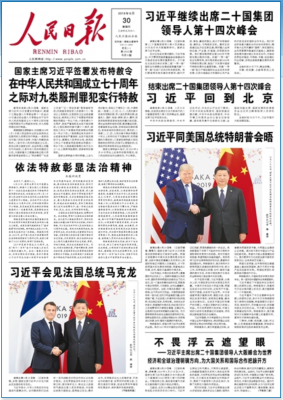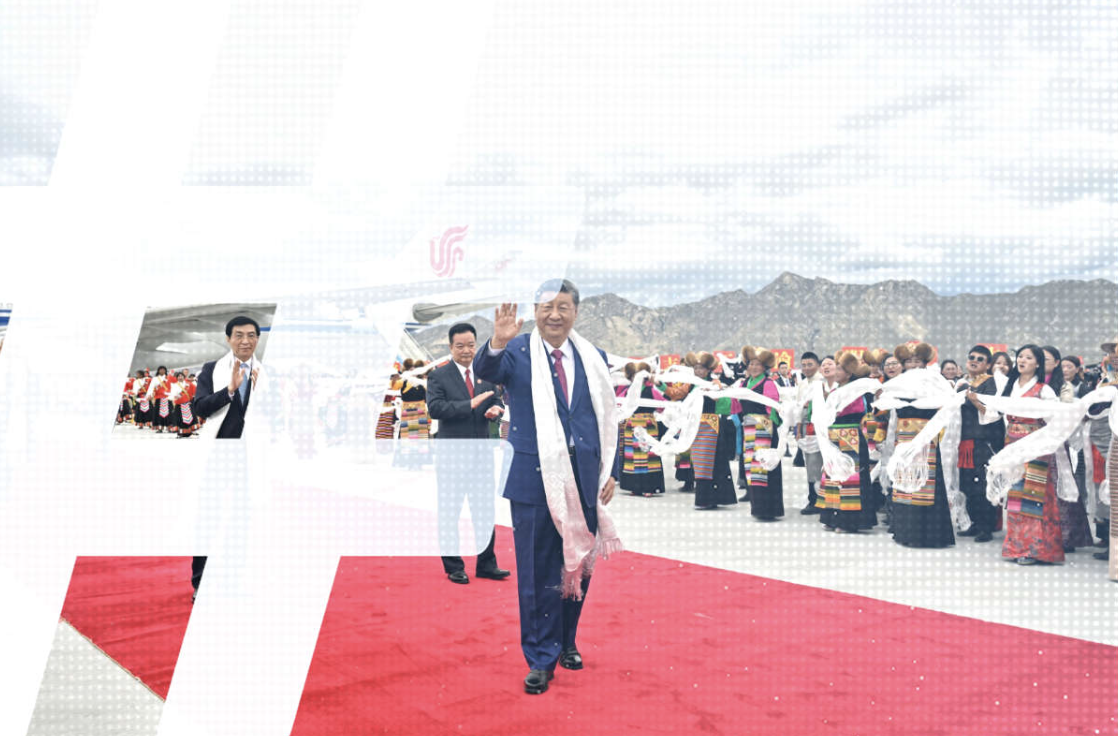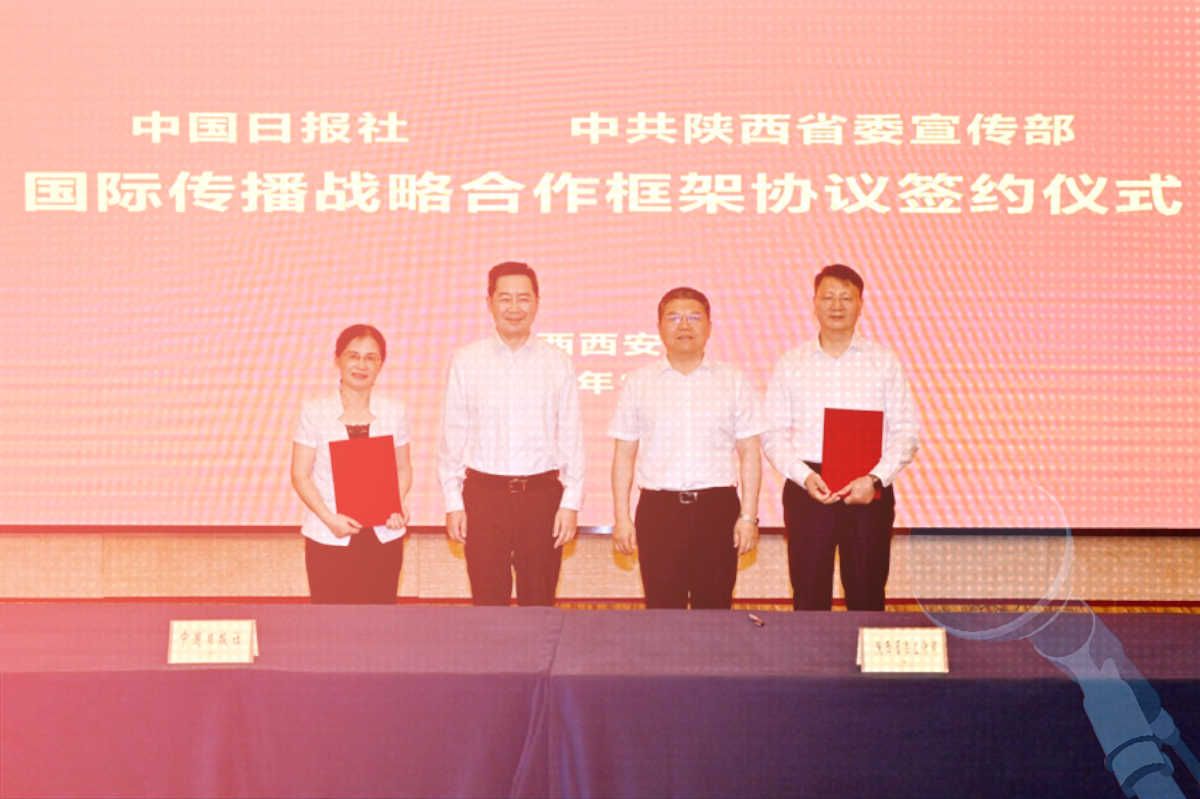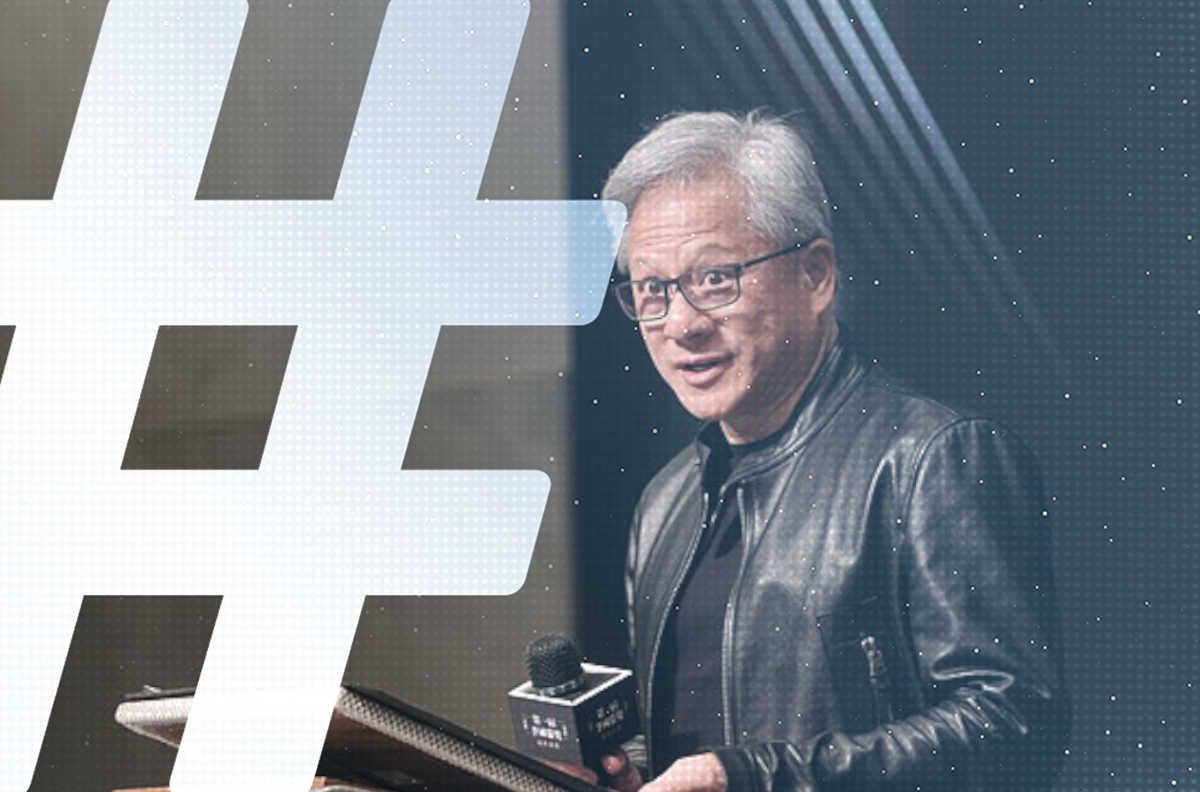China Newspeak
Xi Jinping, Leader of the G20
Reading the official propaganda from Beijing in the wake of last week’s G20 Summit in Osaka, one might have the impression that the Group of Twenty is actually now the “1+19,” and that this “premier forum for international economic cooperation” relies on the forcefulness, grace and wisdom of China’s top leader, Xi Jinping.
Two pieces of propaganda in particular give us a glimpse into the self-aggrandizing spirit of present-day politics in China, and how the current leadership views itself, narcissistically, in the mirror of global turmoil.

The first of these is the transcript of a discussion with China’s foreign minister, Wang Yi (王毅), published on the front page of the official People’s Daily newspaper last Friday, June 30, the day after Xi Jinping’s visit to Japan. The second is a very similar “roundup” (综述) released by China Central Television’s official news program, Xinwen Lianbo (新闻联播).
Taken together, these articles are quite shameless examples of “adulatory articles,” or chuipeng wenzhang (吹捧文章), in this case depicting General Secretary Xi Jinping as the leader of the world.
Let’s just walk through the CCTV piece, which is titled (fasten your seatbelts) “Not Fearing that Drifting Clouds Will Obsure The Eyes—A Summary of President Xi Jinping’s Attendance at the G20 Summit in Osaka” (不畏浮云遮望眼——习近平主席出席二十国集团领导人大阪峰会综述). The line at the front of the headline is the first half of a couplet from the verse of Wang An’shi (王安石), a poet and government official from the Northern Song dynasty. The word “transience” here, or fuyun (浮云) points to the changeable nature of global affairs today, and a more literate reader would naturally think here of the second part of the couplet, which goes: “As I occupy the highest levels” (自缘身在最高层). The couplet together would be rendered something like:
Drifting clouds cannot obscure my vision,
For I am at the top of the world.
The unmistakable implication here is that Xi Jinping is supreme, on high, at the highest levels – and of course that China stands atop the world.
The transcript begins:
From June 27-29, General Secretary Xi Jinping attended the 14th Leadership Summit of the G20 in Osaka, Japan. This G20 Summit took place at a historical juncture at which the international situation is interwoven with turmoil. Standing in the tide of the times, none of these drifting clouds obscure the vision of General Secretary Xi Jinping, who from the heights of building a new form of international relations and a community of common destiny for mankind, has pointed a clear direction for the world economy and for global governance, has taken the pulse (把脉开方) of relations among the major powers and in international cooperation, and who has shown the vision and sagacity of Chinese leaders, playing the role of a responsible major power.
This talk of “standing in the tide of the times” suggests that it is Xi Jinping who now defines this global era and points the way forward. The “building of a community of common destiny” is Xi Jinping’s chief foreign policy buzzword. The idea of Xi “pointing a clear direction” is premised on the notion that the world has lost its direction and now relies on the enlightening leadership of Xi, who is serving in the role of the doctor, “taking the pulse.” This talk of his “vision and sagacity”– that is of course unalloyed eulogizing.
The transcript continues:
Within these two days, Chairman Xi Jinping took part in more than 20 consecutive events, raising high the banner of multilateralism, advocating the spirit of cooperation in partnership, putting into practice the concept of mutual benefit and win-win, and explaining the proposition of common development. Inside the Summit, Chairman Xi Jinping’s important speech resonated, and the China concept and plan [for the world] were broadly supported. Outside the Summit, Chairman Xi’s summit diplomacy drew the eyes of the world, and the meeting of the leaders of China and the US was a focus of attention. Public opinion inside and outside [China] gave a lofty assessment, holding that Chairman Xi’s visit served to build consensus, enhance understanding, promote cooperation, and convey confidence, making important contributions to the success of the Summit, and increasing stable prospects for the peace and development of the world.
What evidence can the People’s Daily present to support its claim that Xi Jinping’s speech “resonated”? Is it true that there was “broad support,” or that “public opinion inside and outside [China] gave a lofty assessment”?
However valid, these questions are pointless in light of the narrative these propaganda pieces are building around Xi’s presence at the G20. The point of the story is that Xi Jinping was the presence at the G20, that Xi stands at the very top of the pyramid of national leaders.
As the global economy stands at a crossroads, as a crucial stage of transformation of the international system, the importance and urgency of the G20 for increasing policies for cooperation and coordination is enhanced not diminished. Chairman Xi Jinping, focussed on the development requirements of the times, advocated that all sides respect objective principles, grasp the overall development trends, embrace their common future, and persist on the following four points: 1. persist in reform and innovation, unearthing the forces of growth and achieving high-quality development; 2. persist in keeping up with the times, perfecting global governance and promoting reform of the global financial system; 3. persist in rising to challenges, breaking through development bottlenecks and allowing more countries and regions to benefit from economic globalization; 4. persist in the spirit of partnership, handling differences properly and expanding consensus through equal consultation. These calls pointed the direction for dealing with the challenges facing the global economy, and they serve to further broaden space for global development, helping to create a positive environment for international cooperation.
The portions highlighted above convey the clear idea that Xi Jinping is striding out in front, pointing the way for all of the world’s major countries. He is the leader of the “1+19.” This is even clearer in the People’s Daily version of the discussion with Wang Yi, which says that “Xi led G20 cooperation in the right direction” (引领G20合作的正确方向).
But let us continue with the Xinwen Lianbo tribute:
Linking with relevant agendas of the G20 summit, Chairman Xi Jinping introduced the high-quality establishment of the “Belt and Road” concept, and energetically called for international innovation and cooperation, emphasizing the need to transcend territorial confines and artificial borders, letting the fruits of innovation reach more nations and more people. These calls were self-confident and magnanimous, powerful and resonating, showing the enormous embrace between China’s own development and the common development of the world.
“Self-confident and magnanimous.” “Powerful and resonating.” “Showing enormous embrace” of the world. China’s Party-run media have shown a superlative knack for lining up superlatives in support of Xi Jinping. So perhaps these, however over-the-top, are no surprise.
But let’s remember also that are delivered in what is packaged as a discussion with Wang Yi, China’s foreign minister. The piece concludes with an assessment of Xi Jinping’s enormous, stupendous and prodigious contributions to China’s foreign relations history:
On this trip Chairman Xi Jinping coordinated multilateral and bilateral [engagements], covering both developed countries and newly-emerging markets as well as developing countries—another successful example of China’s comprehensive diplomacy. Since June this year, Chairman Xi has made four trips abroad, notching up a record in the history of foreign relations in the New China [since 1949]. These four important foreign relations events were closely connected or coordinated, achieving a further raising of China’s international influence, a further perfecting of our overall diplomatic arrangements, and a further expansion of our strategic operational space. As change and disorder continue in the world today, as a number of factors of instability and uncertainly continue to spread, we must take Xi Jinping’s Foreign Relations Thought (习近平外交思想) as our guide, maintaining clarity, responding steadily, being proactive, striving to create new achievements for Great Nation Diplomacy with Chinese Characteristics (中国特色大国外交).
In the seven years since Xi Jinping came to power, China has utterly cast aside Deng Xiaoping’s foreign policy strategy of “hiding one’s capabilities and biding one’s time,” or tao guang yang hui (韬光养晦). Increasingly, it has taken a more aggressive tone, elbowing its way forward and inspiring global unease. There are plenty of indications that the international situation for China has grown worse, with countries across Europe, Asia and North America becoming far more vigilant about its ambitions. As China’s ultimate decision-maker, it is Xi Jinping — and not the country’s top diplomat, Wang Yi — who bears the brunt of responsibility for this situation.
When reading high praise in the context of Chinese political discourse, it is always important to remember that praise, particularly when excessive, can be a way of damning as much as cheering. One wonders, when Wang Yi voices praise so insistently in the wake of the G20 Summit — is this a sign of confidence, or a sign of unease at home? Should we read this as an act of high-level satire, or gaojihei (高级黑), through an act of clumsy and ill-wrought Chinese Communist Party verbiage (低级红)?
Is this Wang Yi’s way of being diplomatic?




















